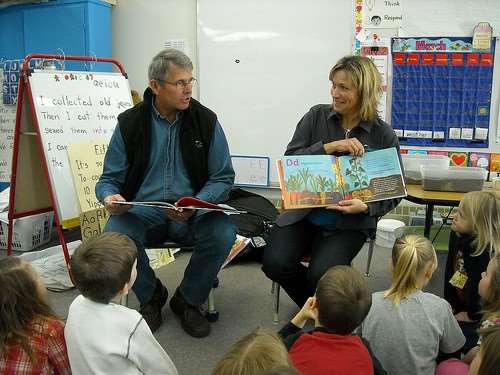AITC-C expanded its ag literacy program to last through March
By Jennifer Jackson
As many farmers and agriculture experts agree, educating the public with proper facts and truths regarding farming is crucial. Now is the time to talk about agriculture, as March is Canadian Agriculture Literacy Month (CALM), according to Johanne Ross, executive director for Agriculture in the Classroom Canada (AITC-C).
2017 marks the first year that this literacy program – normally a week long – will be celebrated for the full month.
The main focus of CALM is to bring farmers and ag industry representatives into classrooms across the province to speak about agriculture and their food stories.
CALM is targeted to students in kindergarten through grade eight. For younger students, ag representatives will read a farm-related book; for older students, young industry members will visit and promote the innovation in the industry, says Ross. All classroom programs, despite the age group, will include interactive components and informative conversations.
“Our goal with AITC-C is to connect students with Canada’s agriculture food story. We want to help kids understand where their food comes from because many are disconnected from this story, and are very interested in this story,” she says. “They’ve taken an interest in where their food comes from, (asking questions like) is it safe, what happens before (the food) gets to the grocery store and how can we connect with a farmer.”
With CALM participation, teachers will also receive teaching material for use prior to and after the farmer presentation.
“We want to inspire students to get curious about agriculture and to understand the unbelievable and dynamic career opportunities that are available to them in the industry. Often students think that agriculture (only) equals farming,” Ross says.

Photo Source: AITC-C
AITC-C has various types of ag education resources in addition to the CALM program. AITC-C provides teachers with curriculum-based learning tools to incorporate into their classrooms. The organization also connects students and teachers with additional agriculture learning opportunities, such as farmer presentations or farm field trips.
“The students have a ball. We make (the learning) fun – the little kids love the farmers, they are like big heroes to (the kids),” says Ross. “For the older students, we try and bring in young people working in the industry to explain that (agriculture) is a dynamic industry full of cutting edge technology – and that (students) can get a high paying job that (could be located anywhere from) outside (to) downtown business offices.”
Educating students benefits everyone in the industry, according to Ross.
“We are ultimately dealing in an industry that is on the verge of a public trust issue. There are a lot of misconceptions about the production of food in Canada, famers, our technologies and our innovations,” says Ross. “The real benefit (of education) is the future of this industry. We are trying to increase awareness and (gain) the opportunity to have important discussions with young people about what is truly happening in our industry.”
We are also creating “informed consumers,” she says. “These young people can now (grow up) feeling confident about (their) informed food choices.”
One ag industry member that also believes in educating students is Resi Walt, member services representative for Northumberland, Hastings, Prince Edward, and Lennox & Addington County for the Ontario Federation of Agriculture.
“Generations of children are growing up more removed from agriculture – the last farm in their family could’ve been two or three generations ago,” she says. “Teaching children about agriculture – specifically, what type of farming occurs in Canada, how animals are raised, or how food goes from the farm to processing – sets them up for a life where they have a better appreciation of what they see at the grocery store and, particularly, what happens on Canadian farms.”
Walt jumped at the opportunity to share her agriculture knowledge with students on Canadian Agriculture Day, Feb. 16.
“I was asked to come to a school to speak about agriculture and there was no way I was saying no,” says Walt. “We have to take every chance we get to talk about agriculture. If not us, then someone else will tell Canadian agriculture’s story and it won’t be as honest or as genuine as it is coming from a farmer.”
AITC-C leads the CALM program with sponsorship from Farm Credit Canada. Farmers and industry representatives that would like more information on programs, or how to participate in classroom education sessions, can visit the AITC-C website.